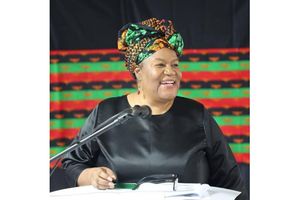Form Two results highlight STEM challenges in Tanzanian schools

A student some mathematics equations. Photo | File
What you need to know:
- While the pass rates for some subjects like Home Economics showed improvement, subjects such as Basic Mathematics, Physics, and Chemistry continued to pose significant hurdles for students.
Dar es Salaam. Performance in Natural Sciences, Mathematics, and Technology subjects remains a significant challenge for many students in Tanzania, according to the 2024 Form Two National Assessment (FTNA) results.
The results, announced by the National Examinations Council of Tanzania (NECTA) on January 4, 2025, show a slight improvement compared to 2023.
However, experts warn that more work is needed to improve performance in Science, Technology, Engineering, and Mathematics (STEM) subjects.
An education specialist at the University of Dar es Salaam, Ms Grace Mwambene, said poor performance in STEM subjects was rooted in outdated teaching methods and limited resources.
“Most schools still use traditional ways of teaching, which don’t encourage students to think critically or solve problems. We need more practical sessions and modern equipment to make these subjects interesting,” she told The Citizen.
Ms Mwambene also pointed out that the shortage of qualified science teachers is a major problem.
“The student-to-teacher ratio in rural areas is alarming. Many schools lack specialised teachers in subjects like Physics, Chemistry, and Mathematics. Without qualified teachers, students will continue to perform poorly,” she added.
Announcing the results, NECTA's Executive Secretary, Dr Said Mohamed, stated that the pass rates for subjects such as Engineering Science, Information and Computer Studies, and Home Economics ranged between 51.46 percent and 62.97 percent.
“Subjects like Basic Mathematics, Physics, Chemistry, Agriculture and Biology recorded pass rates below average, ranging from 18.85 percent to 47.00 percent,” said Dr Mohamed.
Despite this, Dr Mohamed noted that some subjects, including Home Economics, Physics, Chemistry and Additional Mathematics, showed improvements in pass rates. The increase ranged from 3.18 percent to 14.65 percent compared to 2023.
The government has been working to promote STEM education through various initiatives. These include providing scholarships for students pursuing science courses and equipping schools with science laboratories.
In 2023, the ministry of Education launched a campaign to encourage girls to take up STEM subjects. This initiative aims to reduce gender gaps in science fields.
However, education policy expert Leonard Kalokola argued that the efforts are yet to yield significant results.
“We need more strategic interventions. The government should increase investment in teacher training, ensure all schools have laboratories, and introduce mentorship programmes to inspire students to pursue STEM careers,” he suggested.
Challenges in Basic Mathematics
Basic mathematics remains the most challenging subject for students. According to NECTA, 81.1 percent of the 796,316 students who took the assessment in 2024 scored Grade F. In 2023, 78.9 percent had failed the subject.
Mr Kalokola attributes this to how the subject is taught.
“Mathematics is often taught as a theoretical subject. Students memorise formulas instead of understanding concepts. We need to change this approach and make learning more practical and relatable,” he explained.
In Chemistry, 65.7 percent of students scored Grade F in 2024, compared to 71.8 percent in 2023. Similarly, Engineering Science recorded a higher failure rate, with 48.5 percent scoring grade F, up from 40.6 percent in 2023.
Education consultant Agnes Kalembo said the private sector should play a bigger role in improving STEM education.
“Private companies, especially in the technology and engineering sectors, can partner with schools to provide resources and mentorship programmes. This can motivate students to see the relevance of these subjects in real life,” she noted.
Some organisations have already started taking steps in this direction. For example, Vodacom Tanzania has been running a digital learning programme to enhance STEM education in secondary schools.
Efforts to promote STEM education among girls have been ongoing. However, data shows that girls still lag behind boys in these subjects.
“There’s a stereotype that science is for boys. We need to break this mindset by showing girls that they can excel in STEM subjects too,” said Ms Kalembo.
According to NECTA, 54.16 percent of the registered candidates for the 2024 FTNA were girls. However, their performance in STEM subjects remained below average.
Experts also call for reforms in the school curriculum to make it more aligned with modern-day needs.
“The current curriculum focuses too much on theoretical knowledge. We need a curriculum that emphasises problem-solving, critical thinking, and innovation,” argued Ms Mwambene.
Overall performance
Despite challenges in STEM subjects, NECTA reported an overall improvement in the FTNA results. About 30.08 percent of students scored between Grades I and III in 2024, compared to 27.73 percent in 2023.
Experts recommend a multi-pronged approach to improve STEM performance. This includes investing in teacher training, improving learning environments, involving the private sector, and reforming the curriculum.
Ms Mwambene emphasises the importance of early interventions.
“We need to catch students at a younger age and introduce them to science concepts in primary school. This way, they develop an interest in STEM subjects early on,” she stressed.
She also calls for continuous assessment methods instead of relying solely on exams.
“Regular assessments can help track student progress and address challenges early,” she added.
With the right interventions, experts believe that Tanzania can improve its performance in STEM subjects and produce a skilled workforce to drive the country’s industrialisation agenda.





